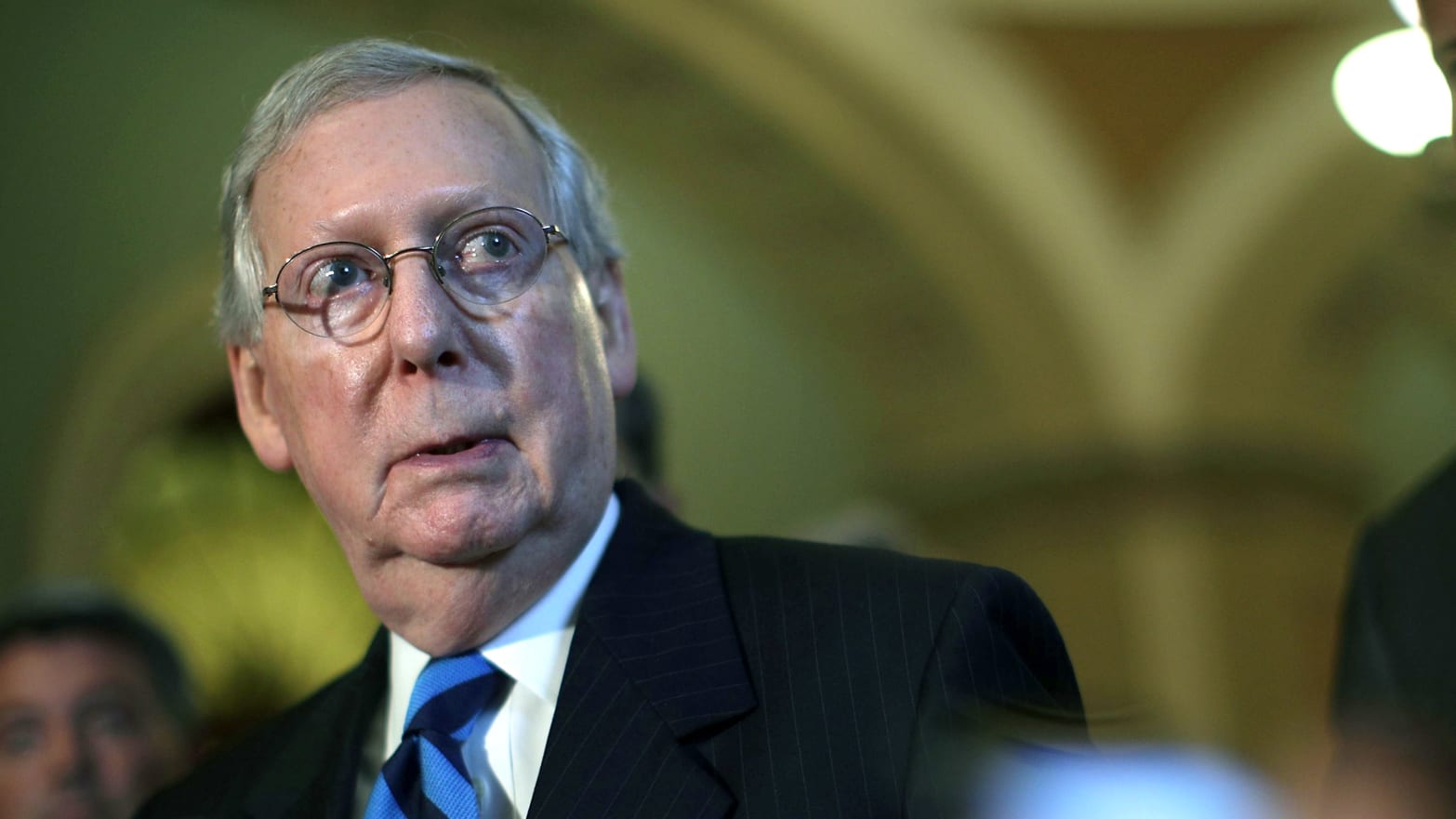Over the objections of GOP leaders, the House passed a bill Wednesday that would create a bipartisan and independent commission to examine the Jan. 6 attack on the U.S. Capitol.
The House voted 252-175, with 35 Republicans joining all Democrats in support of the bill.
With 35 House Republicans voting for the commission, there’s a possibility Democrats in the Senate can find enough Republicans there to support the panel, but the odds are long. While the number of GOP defections is a bit of an embarrassment for Minority Leader Kevin McCarthy (R-CA) and his leadership team, it’s probably not quite the jailbreak that Democrats needed to convince their Senate colleagues to go against Senate Minority Leader Mitch McConnell (R-KY).
Democrats would need 10 Republicans to overcome a GOP filibuster for 60 votes in the Senate, otherwise the bill establishing the commission won’t make it to President Joe Biden’s desk.
Still, Democrats found themselves surprised at the number of GOP defections. “That’s a good showing,” Intelligence Chairman Adam Schiff (D-CA) told The Daily Beast. “It should be everyone. But given the death grip Donald Trump has on his party, I think it’s encouraging.”
Debate in the House on Wednesday was mostly one-sided. More Republicans spoke in support of the commission than those who spoke against it. But the GOP arguments against the legislation were particularly divorced from reality.
Rep. Louie Gohmert (R-TX) implored Democrats to start being bipartisan and stop using “every tool as a partisan stick to beat Republicans.”
“Look, things have changed a lot since the 9/11 commission,” Gohmert said, “because back then, we did not have a problem on both—either side of the aisle condemning anti-semitic remarks.”
Fellow Texas Republican Rep. Chip Roy argued that an independent commission was unnecessary because Congress already has committees that could subpoena people and investigate Jan. 6.
“Let's use the powers that we have and the powers of this body and the committees we have to seek the truth to the information wherever it may lead,” Roy said.
But Democrats and some Republicans contended that an independent and high-profile commission—like the one Congress created after 9/11—was an important step toward accountability and future safety.
Schiff invoked that example to justify the Jan. 6 commission. He told The Daily Beast that Congress did important work to probe 9/11 but that the commission brought “tremendous added value” because it was outside the political process and was staffed with trusted figures.
“That's what we need here, so that the recommendations that come out of the commission will be broadly accepted by the public,” Schiff said.
House Majority Leader Steny Hoyer (D-MD) particularly took offense to the GOP contention that the commission ought to broaden its scope to all sorts of political violence, not just the violence that occurred on Jan. 6.
“It's vital that Congress establish a bipartisan, independent commission to investigate January 6. Not some other date,” Hoyer said. “That does not absolve any wrongdoing anywhere, any time. But it says that this unique insurrection is a danger to our democracy. Not to Republicans and Democrats. To our democracy. To our Congress. To the people's House and the United States Senate, which was occupied."
Rep. John Katko (R-NY)—the top Republican on the Homeland Security Committee who brokered the deal—also spoke in support of the bill, saying an independent commission was “critical for removing the politics around January 6.”
“The American people and the Capitol Police deserve answers and action as soon as possible to ensure that nothing like this ever happens again,” Katko said. “We must find answers to the many questions surrounding that day.”
All of this drama to create a bipartisan commission comes after four months of negotiations and a flurry of recent opposition from GOP leaders.
After Katko finalized a deal with Homeland Security Chairman Bennie Thompson (D-MS) last week to create the commission, McCarthy promptly blew it up on Tuesday.
And although McConnell said later in the day on Tuesday that he was undecided, he woke up on Wednesday and himself called the proposal “slanted and unbalanced.”
The only thing that had seemed to change was that former President Donald Trump issued a statement Tuesday night calling the commission “partisan unfairness.”
While McConnell and Republican allies tried to come up with reasons on Wednesday why that was the case, their rationales didn’t seem to match up with the legislation.
The bill that the House passed Wednesday would create an independent commission composed of 10 people outside of government—five to be picked by Democratic leaders, and five to be picked by Republican leaders. The commission would have subpoena power, but only if the Democratic chair and GOP vice chair agreed, or absent that agreement, if a majority of the commission approved.
The one item of imbalance Republicans focused on Wednesday was the composition of the staff, which also seemed to be a mostly imagined complaint. The language for hiring staff was almost identical to the bipartisan 9/11 commission, as well as a bill from January establishing an independent commission that had more than 30 GOP cosponsors.
But not long after McConnell’s speech against the legislation Wednesday, those senators who had been undecided, or even supportive, changed their tune.
Sen. Mike Rounds (R-SD), who said on Tuesday that the insurrection could not be “swept under any rug,” said on Wednesday that he’d changed his mind after hearing directly from McCarthy. “Leadership in the House says it’s not bipartisan in nature,” Rounds said, even though the bill was the product of negotiations between Katko and Thompson—with McCarthy’s backing.
After Trump, McCarthy, and McConnell all came out in opposition to the commission, GOP leaders began explicitly laying out a key concern that’s percolated for weeks: that such a commission would damage them politically. “A lot of our members, and I think this is true of a lot of House Republicans, want to be moving forward and not looking backward,” said Sen. John Thune (R-SD), the No. 2 Republican in the Senate. “Anything that gets us rehashing the 2020 elections I think is a day lost on being able to draw a contrast between us and the Democrats’ very radical left-wing agenda.”
The 10 Republican votes needed to pass the bill in the Senate, then, will now be much tougher for Democrats to win. Even senators who would be the building blocks of any bipartisan vote, like Sen. Susan Collins (R-ME), have said they want to see changes to the commission as it is structured.
The Senate GOP’s widespread opposition potentially sets up something momentous: the minority’s first use of the legislative filibuster since Democrats took power in January. The symbolism in such a move is not lost on Democrats. Rep. Eric Swalwell (D-CA) told The Daily Beast such a move would be in line with the GOP’s intent to filibuster voting rights legislation. “They’re just interested in blocking,” he said.
Democrats on both sides of the Capitol say they will plow ahead though, even if the path to establishing the commission is unclear.
Senate Majority Leader Chuck Schumer (D-NY) vowed on Wednesday to put the House’s bill to a vote, no matter what. And Hoyer told reporters that Democrats would find a lane for the review somehow—even if it meant creating a special committee in the House.
That would be a far more diminished version of the commission outlined in the bill, however.
Republicans have pointed to ongoing reviews of the Jan. 6 attack being conducted by congressional committees and various agencies from the federal government, saying their work would be more than sufficient in uncovering what happened and how to prevent it from happening again.
But Rep. Tim Ryan (R-OH), who chairs the House committee that oversees the Capitol Police, said Wednesday that would not be enough. “We're trying to govern the country, so we're trying to set this up,” Ryan said. “If there’s something better, be a part of it.”
“If we can’t get Republican votes on this,” Ryan added, “it’s indicative of what’s to come.”


